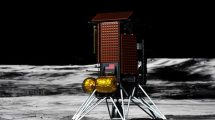 The all-electric KONNECT communications satellite built by Thales Alenia Space for Eutelsat Communications is now undergoing final preparation prior to being shipped to the Guiana Space Center in Kourou, French Guiana, for a launch planned mid-January 2020.
The all-electric KONNECT communications satellite built by Thales Alenia Space for Eutelsat Communications is now undergoing final preparation prior to being shipped to the Guiana Space Center in Kourou, French Guiana, for a launch planned mid-January 2020.
KONNECT will provide high-speed Internet services for markets in Africa and Western Europe. Offering total capacity of 75 Gbps, by next Autumn, this satellite will allow the operator to provide Internet services at up to 100 Mbps speed.
In Africa, it will also allow several users to share an Internet connection via public Wi-Fi hotspots; a service sold via coupons that can be paid on their mobile phones.
The next major step forward will come in 2022 with the introduction of the KONNECT VHTS (very high throughput satellite), also under construction by Thales Alenia Space.
The new KONNECT satellite features all-electric propulsion and operates in Ka-band. It uses Thales Alenia Space’s all-electric Spacebus NEO platform, developed under the Neosat Partnership Project conducted by the European and French space agencies (ESA and CNES).
Commenting on the upcoming launch, Yohann Leroy, Deputy CEO and Chief Technical Officer of Eutelsat, said: “KONNECT is a key to our strategy of developing large-scale satellite Internet services. It will soon be shipped to Europe’s Spaceport for a launch early next year. I would like to thank our industrial partner, Thales Alenia Space, for their all-out commitment to this programme. They are involved in several of our programmes, supporting our goal of reducing the digital divide. These satellites will work with terrestrial networks by providing additional connectivity resources, at a time when access to high-speed Internet plays a major role in both national and regional economic and social development.”
Jean-Loïc Galle, President and Chief Executive Officer of Thales Alenia Space, added: “We are very proud to present our first all-electric Spacebus NEO satellite today, alongside our legacy customer Eutelsat. KONNECT combines innovation and in-orbit heritage to offer a fully modular platform along with an innovative and intelligent payload to provide high throughput, highly agile services in Ka-band. This technological success has been possible thanks to the support from the French and European space agencies, which helped us develop Spacebus NEO, and from the French Investment in the Future Plan, for high-throughput capabilities.”












Add Comment